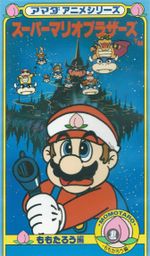Amada Anime Series: Super Mario Bros.
The title of this article is official, but it comes from a non-English source. If an acceptable English source is found, then the article should be moved to its appropriate title.
| Amada Anime Series: Super Mario Bros. | |
|---|---|
 The cover of Super Mario Momotarō | |
| General information | |
| Writer(s) | Juri Yagi |
| Voice actor(s) | Tôru Furuya Miyako Endō Naoki Tatsuta Masaharu Satō Toshiko Sawada |
| Country of origin | Japan |
| Original language | Japanese |
| Rating | TV-Y7-FV |
| Production | |
| Production company | Studio Junio |
| Distribution | |
- This article is about the three animated stories based on well-known fairy tales. For the Mario animated movie, see Super Mario Bros.: Peach-hime Kyūshutsu Dai Sakusen!.
The Amada Anime Series: Super Mario Bros. (アマダアニメシリーズ スーパーマリオブラザーズ) is a series of animated stories. It is a collection of three original video animations based on fairy tales and Japanese folk tales and was released only in Japan on August 3, 1989. The series used characters and other elements from the Mario franchise in place of characters and concepts from the original fairy tales.
The series contains: Super Mario Momotarō, Super Mario Issun-bōshi, and Super Mario Shirayuki-hime. The two former episodes in the series are retellings of fairy tales of the same name, while Super Mario Shirayuki-hime is a retelling of the Western fairy tale Snow White. When the titles are read aloud by the narrator, the possessive particle の no is spoken between "Super Mario" and the name of the specific story; translated, this would render the titles as "Super Mario's Momotarō", etc.
Voice cast
- Tōru Furuya as Mario
- Miyako Endō as Princess Peach, Toad, Morton, Wendy[citation needed]
- Naoki Tatsuta as Luigi, Papa Mario, Roy, Ludwig[citation needed]
- Masaharu Satō as Koopa, Larry, Iggy[citation needed]
- Toshiko Sawada as the narrator
Episodes
Gallery
Princess Peach along with Ojīsan and Obāsan.
Mario being born from a peach.
Mario punches Roy.
Mario, Princess Peach, and seven Toads.
Trivia
- One piece of music used in the series, "New Hampshire Hornpipe," written by Dave Grusin, was originally composed for and used in the 1981 American drama film On Golden Pond.
- Another piece of music used in the series was "p:Machinery", a song recorded by German new wave/synth-pop band Propaganda.
- Some more pieces of music used in the series were "Snapshot," "Comes and Goes," and "Donna" by English avant-garde synth-pop group Art of Noise.
External links
- Amada Anime Series: Super Mario on IMDB.com
- The Mushroom Kingdom - Super Mario Bros. (Amada series)
- Super Mario Momotaro (HQ Restored Version)[dead link]
- All three films







